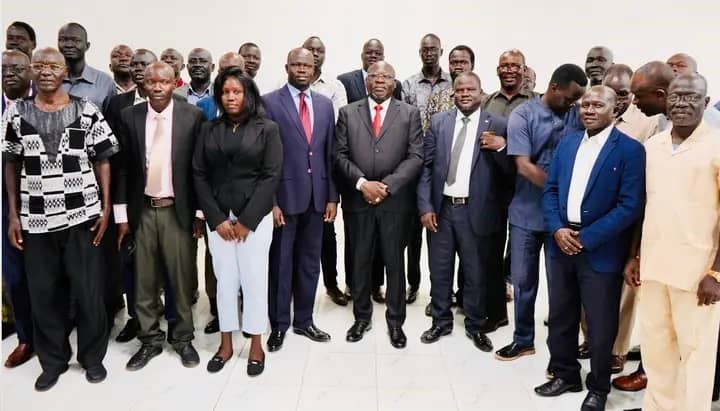Our Terms & Conditions | Our Privacy Policy
National, state officials convene to build capacity on budget preparation, development – The City Review South Sudan
The workshop aims at guiding and supporting state-level government officials in preparing effective budgets through the use of standardized tools and updated information.
By Aguok Chok
As the nation awaits the approval of the national budget for the financial year 2025/2026 by the Council of Ministers and tabling in Parliament, a nationwide capacity building workshop on budget preparation has kicked off in Juba.
The three-day budget preparation brought together senior finance officials from all the ten states and the three Administrative Areas.
The workshop, hosted by the National Ministry of Finance and Planning in partnership with the World Bank Group, aims at guiding and supporting state-level government officials in preparing effective budgets through the use of standardized tools and updated information.
Addressing the opening session, the Undersecretary for Planning in the Ministry of Finance and Planning, Hon. Benjamin Ayali Koyongwa, emphasized on the importance of participation and commitment from the sub-national level in the country’s overall fiscal planning process.
“Participants are expected to prepare their respective budget for States and Administrative Areas,” Hon. Ayali said. “This workshop is meant to support you with the right tools and processes to do just that.”
As for the national budget, the Undersecretary said the FY 2025/2026 budget was passed by the Economic Ministerial Cluster and awaits Council of Ministers approval before it can be tabled in Parliament.
The workshop participants include Directors General of Administration and Finance, Directors of Planning, and Directors of Revenue Authorities, officials that play a critical role in aligning sub-national plans with national development priorities.
Organized with technical support from the World Bank, the workshop is designed to provide practical guidance on the budget preparation cycle, introduce updated budget templates, and promote collaboration among states and administrative areas.
Officials from the Ministry of Finance and Planning explained that the initiative also forms part of broader reforms aimed at improving fiscal transparency, accountability, and service delivery across all levels of government.
“Building capacity at the state and local level is essential for effective implementation of the national budget,” said a Ministry official. “Through this workshop, we want to strengthen the foundations of public finance in every corner of the country.”
World Bank representatives at the event reaffirmed their commitment to supporting South Sudan’s public financial management reforms. “We are here to help build strong, sustainable systems that support the government’s development goals,” said one of the technical advisors.
Participants expressed appreciation for the opportunity to enhance their budgeting skills and share experiences with counterparts from other states. “This workshop is very useful,” said a representative from Western Equatoria State. “It gives us the tools and direction we need to prepare better budgets for our people.”
The workshop continues until Wednesday, August 6th, with group sessions, presentations, and a review of key milestones for the upcoming fiscal year.
As South Sudan aims to improve financial planning and service delivery, this workshop marks another step forward in empowering local authorities with the skills and resources to manage their own budgets responsibly and effectively.
Macroeconomic instability
The workshop is scheduled at a time when the country is facing enormous economic pressure due to internal conflicts, floods, and external factors such as wars in Ukraine, Sudan, and the Middle East, which have disrupted supply chains and led to macroeconomic instability.
Coupled with the economic downturns, a November 2024 report by UNDP revealed that most states and administrative areas were not preparing their annual budgets in a transparent, comprehensive, and accountable manner, with the budgets being signed into law without legislative oversight and citizen participation.
Furthermore, the UN development body said, both states and administrative areas lacked adequate policy and technical capacity to manage economic functions, undermining progress towards recovery, resilience, and development.
It is against this backdrop that the body rolled out a series of workshops aimed at strengthening the human capacity of economic institutions, review past policy issues, guide budget preparation at the local level, identify challenges, and propose actionable solutions and recommendations aimed at enhancing non-oil revenue mobilization, budget processes, and legislative oversight.
Now, with the Ministry of Finance through support from the World Bank convening a workshop to build capacity on budget preparation ahead of the release of national and states’ respective budgets, it is expected that officials will piggyback on past experiences to enhance proper public finance management.
Daily Newsletter
Images are for reference only.Images and contents gathered automatic from google or 3rd party sources.All rights on the images and contents are with their legal original owners.



Comments are closed.